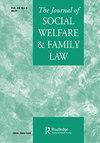烟雾和镜子?第12条条例和家庭虐待受害者获得法律援助的机会
IF 0.6
Q2 LAW
引用次数: 0
摘要
自2012年《法律援助、罪犯量刑和处罚法》实施以来,申请保护性禁令的家庭虐待受害者中没有律师代表的人数有所增加。研究一致指出,严格的法律援助手段标准是其背后的原因,然而,鉴于《2013年民事法律援助(财政资源和服务付款)规例》第12条规定,在申请保护令时豁免财务资格门槛,因此缺乏质疑这种情况的文献。根据对24名法律专业人士的调查和法律援助机构(LAA)根据《信息自由法》的要求提供的信息,本文试图解决文献中的这一差距,并检查第12条法规的价值。调查结果显示,第12条的使用有限,可归因于法律援助从业员对该规例的存在不甚了解,从业员担心在完成档案工作后得不到报酬,以及署长在使用裁量权方面缺乏明确的指引。调查结果十分及时,因为正在进行的法律援助检讨正在审议经济审查。本文章由计算机程序翻译,如有差异,请以英文原文为准。
Smoke and mirrors? Regulation 12 and access to legal aid for victims of domestic abuse
Since the Legal Aid, Sentencing and Punishment of Offenders Act 2012 was introduced the number of unrepresented victims of domestic abuse in applications for protective injunctions, has increased. Studies consistently point to the strict legal aid means criteria as the reason behind this, however, there is a paucity of literature challenging why this is the case, given that provision is made within Regulation 12 of the Civil Legal Aid (Financial Resources and Payment for Services) Regulations 2013 for the financial eligibility thresholds to be waived in applications for a protective order. Drawing on a survey of 24 legal professionals and information provided by the Legal Aid Agency (LAA) following Freedom of Information Act requests, this article seeks to address this gap in the literature and examine the value of Regulation 12. Findings indicate that the limited use of Regulation 12 can be attributed to a weak understanding amongst legal aid practitioners about its existence, concerns amongst practitioners about not being remunerated for work completed on files and an absence of clear guidance for the Director as to the use of the discretion. The findings are timely as the means test being considered by the ongoing Legal Aid Review.
求助全文
通过发布文献求助,成功后即可免费获取论文全文。
去求助
来源期刊
CiteScore
2.00
自引率
13.30%
发文量
52
期刊介绍:
The Journal of Social Welfare & Family Law is concerned with social and family law and policy in a UK, European and international context. The policy of the Editors and of the Editorial Board is to provide an interdisciplinary forum to which academics and professionals working in the social welfare and related fields may turn for guidance, comment and informed debate. Features: •Articles •Cases •European Section •Current Development •Ombudsman"s Section •Book Reviews

 求助内容:
求助内容: 应助结果提醒方式:
应助结果提醒方式:


